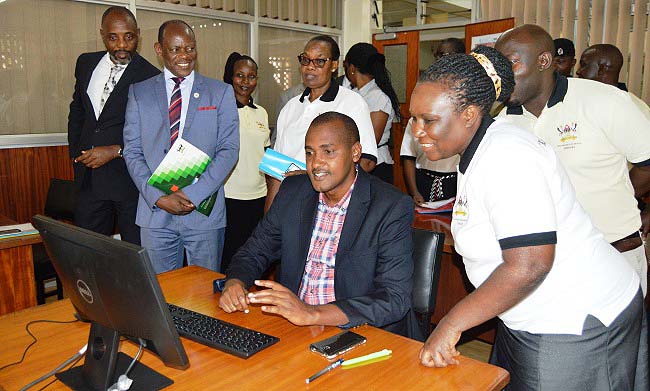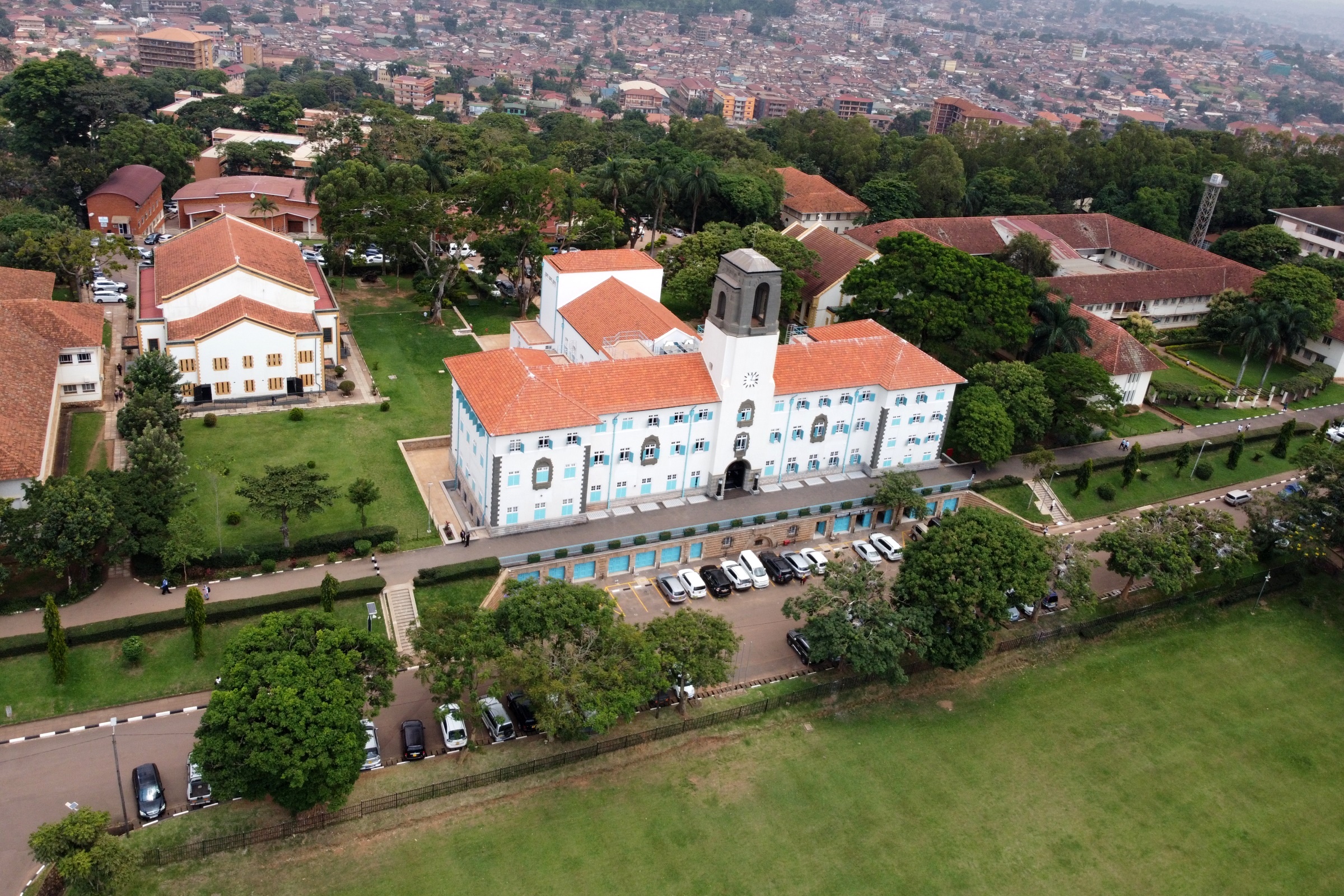The World Library Day Celebrations held on Friday, 13th July 2018 in the University Library concluded on a high as the Minister of ICT and National Guidance-Hon. Frank Tumwebaze and Executive Director, National Planning Authority (NPA)-Dr. Joseph Muvawala both graciously accepted the request to champion efforts to raise funds to support procurement of e-resources and related library activities at Makerere University. The request had earlier been presented by the University Librarian-Dr. Hellen Byamugisha and reiterated by the Vice Chancellor, Prof. Barnabas Nawangwe.
“I wish to thank you for the invitation to champion this fundraising initiative and to this I say, let us establish a partnership with the Ministry of ICT immediately. We are supporting AIMS (Academic Information Management System) so under the same framework we can support the TISC (Technology and Innovation Support Centre). I request the Vice Chancellor to get in touch with my Permanent Secretary so that we can work this out” remarked Hon. Tumwebaze in response.

Earlier, Hon. Tumwebaze had launched the TISC, housed on the Main University Library’s Second Floor. TISC is an initiative of the World Intellectual Property Organization (WIPO); the Uganda Registration Services Bureau (URSB) being the National focal point, tasked with identifying potential host institutions. The TISC will the promote the quality of research and innovation of staff and students at Makerere University by providing access to patent information, scientific journals and training on Intellectual Property (IP) laws and patents.
“I thank you for moving the University Library from its orthodox state and making it relevant in the digital space. Digitization will enable you to store information for posterity. The only competition Makerere University has in this country is its own record. For you to compete with this record you must be innovative, and the TISC is one such innovation by Makerere. I therefore urge you all to accept this new idea and support it” said Hon. Tumwebaze.

The Minister further commended Prof. Nawangwe for championing the use of ICT and promoting Makerere University’s brand by being active on the social media platform Twitter. “Content is what rules the digital space as well as the virtual space. If you have no content, people will not follow you. The great Makerere should always remain great. I therefore urge you to continue publishing quality content so that we can defeat instances of fake news and alternative facts” he added.
Delivering the keynote address at the celebrations Dr. Muvawala started off by commending his alma mater Makerere University for moving library services in the right direction through digitization and embracing E-resources. He noted that the maximization of the power of information results into effective service delivery. “Information is not just a necessity but also a serious condition for efficiently running public policy and life” he explained.

He nevertheless urged the University Library to align its services to the planning perspective by embracing a global mindset that reduces the distance between its resources and users by delivering services in real-time. He further challenged the University Library actors not to sit back and be content with their achievements but rather actively participate in public dialogues that shape the policies that affect them.
“I thank you for inviting me to deliver the keynote. Now that I am informed about your activities, I can say that you are selecting the right champion. A vision isn’t a vision if it is not shared. The Uganda 2040 envisions a knowledge-based society where our planning and growth is based on knowledge and research. Our vision underpins the need for accurate, reliable information and the Makerere University Library as the National repository ought to play a visible role.

“As we celebrate this world library day and the advantages of remodeled libraries in informed societies, the role played by the oldest library in Uganda is unequalled. This is what makes Makerere truly Makerere. The only way to compete with Makerere is by doing what you do better, and as a Convocation we have to promote this university every day of our lives” enthused Dr. Muvawala.
In his remarks, Prof. Barnabas Nawangwe thanked Hon. Tumwebaze and Dr. Muvawala for honouring invitations to their alma mater. He reiterated the key support role played by the University Library; being at the heart of all teaching, learning, research and innovation services at Makerere University.

“I had never fully comprehended the importance of the Makerere University Library until I heard from a Professor while I was visiting the University of Michigan in May this year that we had the best library in Africa! He however warned that all the precious collections we had risked being lost due to the wear and tear unless we digitized them” remarked Prof. Nawangwe.
He therefore commended the University Library for digitizing the institutional archives and requested the Guest of Honour and Keynote Speaker to continue marketing the University Library. “Makerere is not just a National repository but the best information asset in Africa. I therefore thank the Honourable Minister for launching the Technology and Innovation Support Centre” added Prof. Nawangwe, noting that this would go a long way addressing Africa’s lagging number of patents filed.

Addressing her guests, the University Librarian-Dr. Helen Byamugisha shared that the day’s theme “Remodeled Library Services: Informed Societies” was in line with the governing body of libraries – International Federation of Library Associations and Institutions (IFLA)’s annual theme “Transform Libraries, Transform Societies: Reaching out to the hard to reach."
She added that the Library day was an opportunity to celebrate achievements and experiences by showcasing various sections of the Library through exhibitions to the library users, the general public and policy makers. The Librarian acknowledged that the library had evolved from the initial 1949 40-seater facility to today’s 3,800-seater with a host of digital and specialized amenities.

“Digital technology has revolutionised how our users seek and access information. Makerere no longer restricts itself to print publications. We now have a hybrid of both print and digital technology. Every member of staff has a personal computer and on the ground floor we have a computer for people with special needs to access library services, and a facility for nursing mothers on the fourth floor” remarked the University Librarian.
She paid tribute to her predecessors such as Prof. Maria Musoke and the late Mr. James Mugasha for the firm foundation laid and reported that as a result, the Library Staff establishment now includes three Associate Professors and several PhD holders with a few more in the pipeline. She nevertheless pointed out the heavy dependence on donor funds from development partners such as Sida, the Carnegie Corporation and others to fund procurement of e-resources, subscriptions and procurement of ICTs as a major challenge.

“I therefore call upon Hon. Tumwebaze and Dr. Muvawala to be our champions in this cause of raising funds to support library services. I also request you to include Libraries such as Makerere’s in the National Development Plan” concluded Dr. Byamugisha.
The day’s proceedings were ably moderated by Assoc. Prof. Sylvia Nannyonga Tamusuza who spoke glowingly of the warm relationship between the Main Libarary and the Department of Performing Arts and Film (PAF). “We thank the University Library for hosting the Digital Music Archive, which has the earliest recording of Ugandan music from 1901. The Archive relies on repatriation services from the British Music Archive, Australian Music Archive, the United States and I am happy to say that a number of Ugandan artistes are also depositing their works” she remarked.

The World Library Day 2018 celebrations organising committee was led by the Head Africana Section, Ms. Rhoda Nalubega, who pointed out the key role played by Librarians in the information cycle. “The most important part of Information and Communications Technology (ICT) is Information. We therefore warmly welcome the Guest of Honour and Minister of ICT and National Guidance to this celebration, where you will address the people who bear the largest responsibility in the information cycle” she remarked.
Article by Public Relations Office

 General2 weeks ago
General2 weeks ago
 General1 week ago
General1 week ago
 General4 days ago
General4 days ago
 Natural Sciences4 days ago
Natural Sciences4 days ago
 Health6 days ago
Health6 days ago












